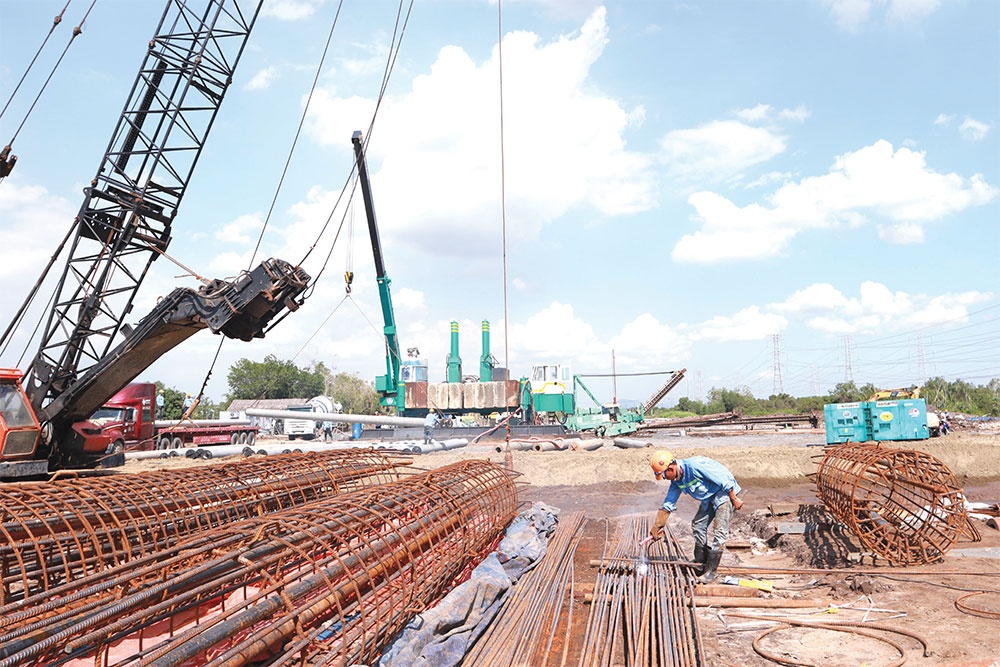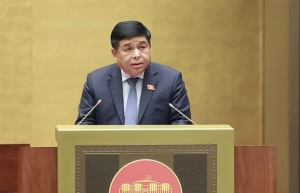Roadblocks to be torn down in policy
 |
| Roadblocks to be torn down in policy, Photo: Le Toan |
Specific policies have been categorised into five policy groups, with each policy accompanying a pilot list of projects. A highlight proposal involves increasing the proportion of state capital participating in public-private partnership (PPP) schemes to a maximum of 70 per cent of total investment, compared to the current 50 per cent.
Another proposal is looking at clarifying rules so that a locality with strong resources can be assigned as investor of road projects that cover several localities.
Other policy rules include investors and contractors not having to carry out procedures to seek licence provision to exploit minerals as common construction materials for transport infrastructure projects, and the remainder of a special mechanism applied to new ventures towards 2025 to use capital from the additional central budget revenue in 2022.
For outside the pilot list, when there is a need and if they meet the set principles and criteria, the government shall submit them to the National Assembly Standing Committee for consideration between National Assembly (NA) sessions.
Once approved, the move will contribute to accelerating the modernisation of Vietnam’s road network, with the top priority that the country will have 5,000km of expressways in place by 2030.
Minister of Planning and Investment Nguyen Chi Dung presented a resolution about these specific policies before NA deputies at a session on October 27.
He noted that several major road projects, proposed to create a driving force to socioeconomic development, might not have significant traffic in the initial stages, and some ventures might envision large demands for site clearance and compensation, accounting for a large part of the costs.
In these cases, applying current regulations would extend the time for capital recouping, making it difficult for investors to raise capital from other investors and credit institutions.
“In these cases, to ensure feasibility and facilitate capital mobilisation, it is crucial to have state capital participation which surpasses half of a projects’ total value to heighten their feasibility,” Minister Dung said.
The cost for site clearance and compensation at several highways can often account for around one-third of the total.
“Raising state capital contribution at PPP road projects to 70 per cent maximally, particularly at major road initiatives, would sooth investors’ pressures in mobilising capital in the current context of constraints,” said a veteran road developer.
NA deputy Tran Hoang Ngan from Ho Chi Minh City said that although some aspects of the draft were not yet synchronised, he expected these specific policies to be approved, particularly the content regarding raising state capital contribution at PPP projects, as well as pushing decentralisation to local management authorities.
“The draft resolution creates breakthrough mechanisms for road infrastructure development. A number of regulations about public investment, state budget, or road transport do not fit current practices and need to be tackled soon to create motivating forces for development, including mobilising resources from localities and from equity investors,” Ngan said.
The policy of assigning a locality with strong resources to investor road projects that cover several localities, and using the budget of one locality to provide capital support to another, was appreciated by the management of many localities at the NA session.
The mechanism is deemed of high necessity in deploying road projects connecting two localities, as the current Law on Public Investment and guiding decrees does not rule about assigning any particular locality to decide on investment policy of ventures that engage more than one locality.
Similarly, in light of the Law on State Budget, it is currently impossible to use the budget of one locality to spend elsewhere.
“We expect the resolution on building the road network to be approved in November to smoothen the implementation of many key road projects currently facing roadblocks,” said Tran Chung, chairman of the Vietnam Association of Road Traffic Investors.
 | Five pilot policy groups proposed for road infrastructure projects Minister of Planning and Investment Nguyen Chi Dung said regulation frameworks must be adjusted to utilise resources, accelerate progress and public investment disbursement in road transport. |
What the stars mean:
★ Poor ★ ★ Promising ★★★ Good ★★★★ Very good ★★★★★ Exceptional
Related Contents
Latest News
More News
- Kurz Vietnam expands Gia Lai factory (February 27, 2026 | 16:37)
- SK Innovation-led consortium wins $2.3 billion LNG project in Nghe An (February 25, 2026 | 07:56)
- THACO opens $70 million manufacturing complex in Danang (February 25, 2026 | 07:54)
- Phu Quoc International Airport expansion approved to meet rising demand (February 24, 2026 | 10:00)
- Bac Giang International Logistics Centre faces land clearance barrier (February 24, 2026 | 08:00)
- Bright prospects abound in European investment (February 19, 2026 | 20:27)
- Internal strengths attest to commitment to progress (February 19, 2026 | 20:13)
- Vietnam, New Zealand seek level-up in ties (February 19, 2026 | 18:06)
- Untapped potential in relations with Indonesia (February 19, 2026 | 17:56)
- German strengths match Vietnamese aspirations (February 19, 2026 | 17:40)

 Tag:
Tag:




















 Mobile Version
Mobile Version